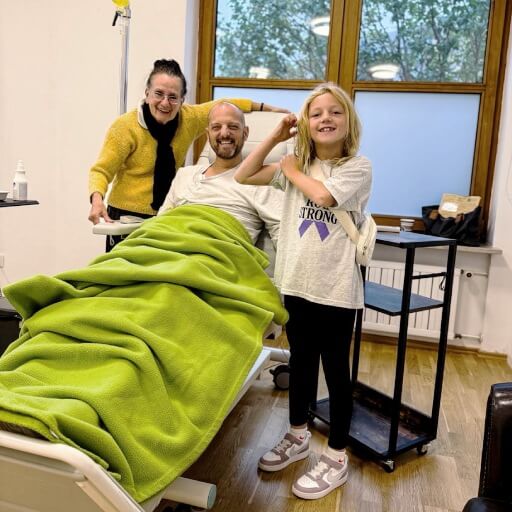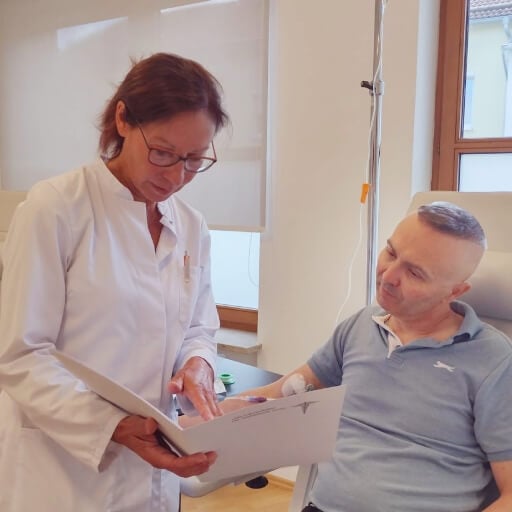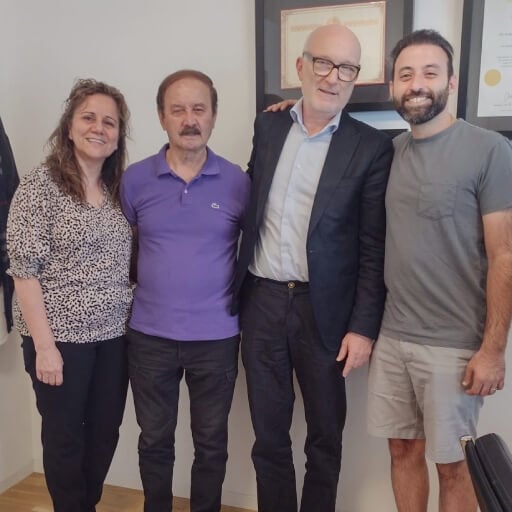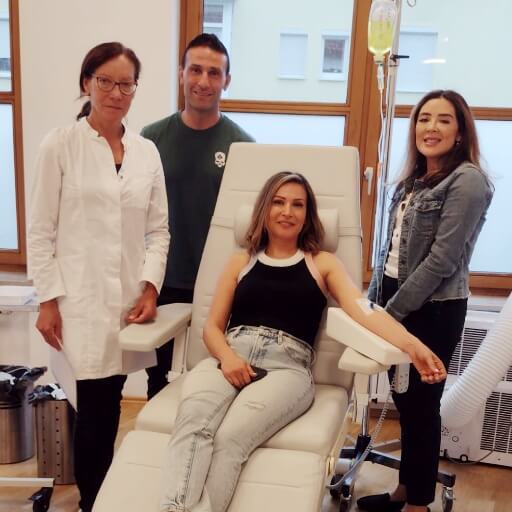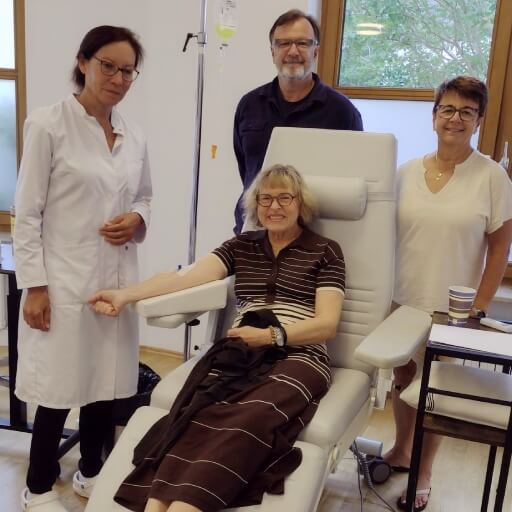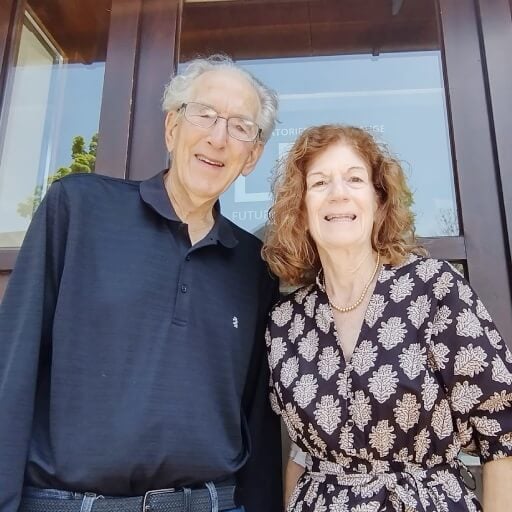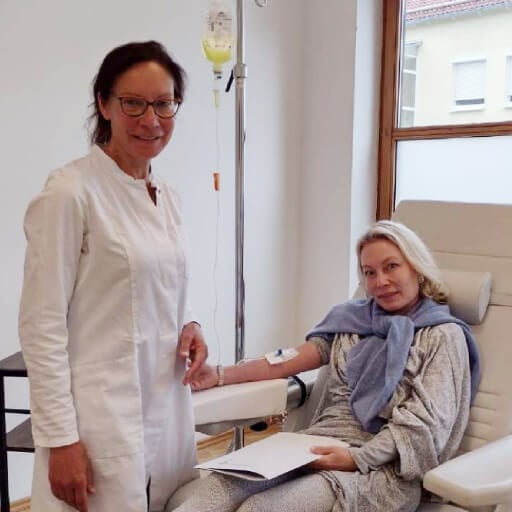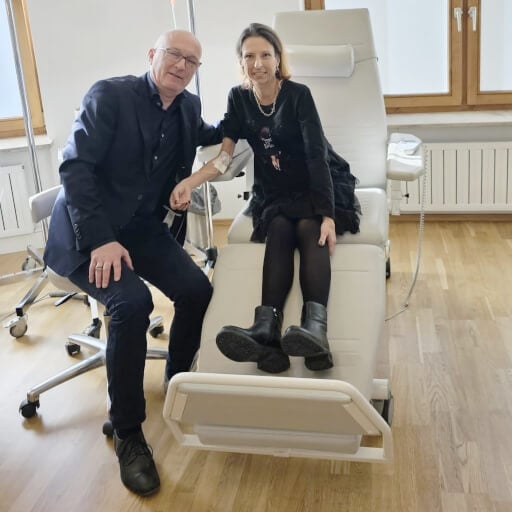Immunotherapy is an innovative method of cancer treatment, and one of the most promising innovations is dendritic cell therapy. This radical approach utilizes the strength of the immune system of the patient to attack cancer and destroy cancer cells. The 2011 Nobel Prize in Medicine, awarded to Ralph M. Steinman as a discoverer of the importance of dendritic cells and their position in the adaptive immunity, was a recognition of their importance in cancer treatment. [1]
German oncologists nowadays provide different forms of immunotherapy, such as specialized cancer vaccines, checkpoint inhibitors, and CAR T-cell therapy, while selecting a specific treatment according to the specific tumor cells of a particular patient. In cancer, immunotherapy in combination with traditional treatment in German clinics is remarkably successful in controlling early and advanced cancer, greatly enhancing survival rates and quality of life, with some cancer patients even attaining stable remission.
How Immunotherapy Works in Cancer
The intricate defense system called the immune system is comprised of organs (bone marrow, lymph nodes, spleen), immune cells (leukocytes), and signaling molecules (interleukins, interferons). It is charged with the responsibility of identifying and eliminating cancer cells. It usually differentiates normal, healthy, and harmful cells and treats the foreign invaders as threats. The immune system uses T-cells to destroy cancer.
Yet, due to several factors, the immune system of the body is unable to control the malignant tumors:
- Since the cells of the malignant tumor have the ability to imitate normal ones, distinguishing between them as dangerous may be difficult
- The immune system eliminates millions of aberrant cells every day, but occasionally the response is insufficient to eradicate cancer cells entirely
- In order to prevent immune system cells and cancer-fighting immune cells from launching a successful attack, some cancer cells secrete chemicals that disrupt immunological checkpoints
Training and boosting the patient's immune system to successfully attack cancer cells and slow tumor growth is the primary objective of cancer immunotherapy. There are various ways to accomplish this:
- To better fight cancer, natural immune response mechanisms should be strengthened and stimulated
- Utilizing adoptive cell treatment, cancer vaccines, or monoclonal antibodies to enhance or replicate particular immune system responses
- Restoring the function of worn-out T-cells against tumor antigens with the use of immune checkpoint inhibitors or targeted therapies
The Nobel Prizes in 2011 and 2018 for discoveries in dendritic cell biology and immunological checkpoints confirm the significance of these developments. To better target tumor cells, control symptoms like pain, and increase survival, German oncologists now mix cutting-edge types of immunotherapy with other cancer treatments, such as hyperthermia. In addition to helping cancer patients, this integrated approach greatly improves their quality of life while undergoing treatment.
Main Types of Immunotherapy for Cancer
Modern cancer immunotherapy works by teaching the immune system to recognize and destroy cancer cells. Each method has its own way of activating T-cells and other immune cells, guiding the body to fight cancer more effectively.
Dendritic Cell Therapy in Oncology
The immune system's sentinels are dendritic cells. To put the procedure simply, doctors first take these cells from the patient and expose them to tumor antigens in a laboratory. Dendritic cells carry these antigens to the lymph nodes after returning to the body, where they are presented to T-cells. This sets off a chain reaction in which T-lymphocytes are triggered, proliferate, and move through the bloodstream in pursuit of tumor cells. T-cells attach to cancerous cells and produce toxins that kill the cancer cells while mostly sparing healthy cells and normal tissues. Other immune cells are recruited, resulting in a coordinated immune response that may last for months or even years.

Monoclonal Antibodies for Cancer
Monoclonal antibodies are substances that work under "navigation". They bind to particular proteins on cancer cells, designating them for elimination. Then they act as flags, attracting T-cells and natural killer cells to attack cancer cells. Others can starve the tumor cells by blocking the signals that the malignancies use to develop. Some monoclonal antibodies carry drugs or radiation directly to the malignant T-cells, allowing immune system cells to destroy them without harming surrounding healthy cells [3]. This specific mechanism strengthens the body's defenses against cancer.
Immune Checkpoint Inhibitors for Cancer
The immune system has built-in "brakes," called immune checkpoints, which normally prevent it from attacking normal tissues. Cancer often exploits these checkpoints to hide from T-cells. Immune checkpoint inhibitors release these brakes, allowing T-cells to stay active longer. Active T-cells multiply, infiltrate the tumor, and release cytotoxic proteins that puncture tumor cells. Moreover, the therapy enhances coordination of the overall immune system, which draws in other cancer-fighting immune cells to further reinforce the attack. The method has revolutionized the outcomes with metastatic melanoma and advanced lung cancer.

Adoptive Cell Therapy (CAR T-cells) for Cancer
In adoptive cell therapy, T-cells of a patient are removed and genetically engineered in a laboratory to turn them into CAR T-cells. Certain tumor antigens have been taught to these cells. Once reinfused, they multiply and actively pursue tumor cells all over the body. CAR T-cells identify the target and attach to the cancerous cell, releasing chemicals known as granzymes and perforins, which pierce through the cell membrane of the cancer cell and kill it. The antigens that are shed by the dying tumor cells also induce the immune system response, which leads to a self-perpetuating cycle of the immune cells and T-cells attacking the cancer in areas where no prior treatment is successful. Prostate, colorectal, and other types of cancers are being researched for this treatment, which has demonstrated impressive results in treating blood malignancies.

When is Immunotherapy Administered to Treat Cancer?
Even in the early stages of the disease, novel techniques like dendritic cell therapy are becoming more widely acknowledged as effective cancer treatments. This is as per the growing evidence that when immunotherapy is administered at an earlier stage, it has a significant positive outcome and may even prevent the development of tumor cells. Cancer immunotherapy can also help cancer patients with early-stage tumors to maintain a high-quality life and have a higher chance of full recovery due to the ability of the immune system to easily attack the cancerous cells, and the side effects are often minimal.
Early intervention has been particularly interesting in the case of dendritic cell treatment. Through early education of T-cells and other cells of the immune system, the immune system is more at liberty to attack cancer cells and prevent their relapse. This technique reduces the risk of relapse and enhances the control of the disease.
Immunotherapy is essential even in advanced cancer, like stage 4 lung cancer, metastatic melanoma, prostate cancer, bladder cancer, and other ailments. It may be administered either alone or together with other forms of treatment to cancer patients, like chemotherapy or radiation, to enhance the general effectiveness. Monoclonal antibodies and checkpoint inhibitors prepare T-cells and other anti-cancer immune cells to attack directly on cancer cells with minimum harm done to normal cells and body organs.
Many clinical studies confirm that immunotherapy works well for different types of cancer. For example, KEYNOTE-059, CP-MGAH22-05, and EPOC1706 showed the safety and effectiveness of immune checkpoint inhibitors in gastric cancer. The PACIFIC study revealed promising results for non-small cell lung cancer with monoclonal antibodies. Over 150 clinical studies in melanoma confirm that immunotherapy can help even cancer patients with stage 4 disease.
Different types of immunotherapy can now be applied to a wide range of types of cancer, including:
- Thyroid tumors
- Lung cancer
- Esophageal tumors
- Mammary cancer
- Stomach tumors
- Liver cancer
- Pancreatic tumors
- Colon cancer
- Rectal cancer
- Ovarian tumors
- Uterine cancer
- Prostate cancer
- Osteosarcoma
- Soft tissue sarcoma
- Melanoma
- Glioblastoma
- Bladder cancer
- Lymphoma
- Kidney cancer
- Leukemia
Current cancer research efforts are focused on finding additional tumor antigens and potential cancer immunotherapy targets. The progress of dendritic cell therapy in various forms of cancer and stages gives hope to cancer patients. Modern cancer immunotherapy can enhance survival, disease control, and fight cancer better than ever by stimulating T-cells to go into action.
Advantages of Cancer Immunotherapy in Germany
Germany is a leader in advanced cancer immunotherapy, and this offers the patient a range of treatment possibilities. German clinics are a combination of the latest therapeutic techniques and accurate diagnostic procedures.
In Germany, physicians use various forms of immunotherapy, which include:
- Monoclonal antibodies that stimulate the immune system recognize the tumor cells
- The use of immune checkpoint inhibitors, which unlock the brakes on T-cells to enhance the response of the immune system
- A change in the tumor environment that makes cancer cells more visible to the immune system
- CAR T-cell therapy, which develops highly specific cancer-killing immune cells that are personalized to match the tumor antigens of the patient
- Dendritic cell therapy, in which the dendritic cells are conditioned to identify tumor cells and induce T-cells to attack cancer
Individualized care coupled with highly developed technology is also one of the greatest benefits of cancer immunotherapy in Germany. The choice of treatment is not only to cure cancer but also to avoid harm to healthy cells, as well as to decrease the side effects. Hospitals in Germany often combine immunotherapy with other types of cancer treatments (e.g., chemotherapy or radiation) to improve overall effectiveness, but without compromising the quality of life of the patients.
Also, continuous improvement in therapy protocols can be attributed to current cancer research work in Germany. Novel tumor antigens, novel cancer vaccines and new approaches to cancer treatment, such as adoptive cell therapy, are extended to new cancer types, such as bladder cancer, prostate cancer, colon cancer and lung cancer. The specialized hospitals are carefully selected and monitored so that cancer patients get the best treatment for the particular condition.
| Toxicity | Therapy Duration | Early Stage Effectiveness (5-year survival rate) | Duration of Treatment Effect | Treatment Cost | |
|---|---|---|---|---|---|
| Dendritic Cell Vaccines | Very low (about 1%) | Single injection and lifelong immunity for a given tumor type | Up to 95% with minimal impact on quality of life | Reliable long-term result, long-lasting remission | €20,000 - €38,000 |
| Chemotherapy | High (65-80%) | Depending on the stage of the disease, lifelong | Up to 75%, with significant side effects | Short-term effect, limited to the course of treatment | €80,000 - €150,000 for the full course |
| Hormone Therapy | Low (10-15%) | Given for several months, usually followed by chemotherapy | Up to 70% for hormone-sensitive cases only | The effect is present only during treatment | €10,000 - €15,000 |
| Targeted Therapy | Low (15-20%) | Depending on the stage of the disease, treatment may take about a year | Up to 75% for matching mutations only | The effect is quite long-lasting in the presence of specific mutations in the tumor | €375,000 - €420,000 for the full course |
*Booking Health data. Success rates vary depending on cancer type, stage, and individual patient factors.
This comparison shows why immunotherapy in cancer, especially dendritic cell therapy, is becoming more popular. It helps the immune system recognize and attack cancer cells directly. Although it can take a few weeks to activate T-cells and other immune cells, the immune system’s response provides lasting protection against tumor cells and lowers the chances of recurrence.
Current research on cancer has continued to push our knowledge boundaries of the immunotherapy types and at what stage they are applied to treat different cancers, such as bladder cancer, prostate cancer, colorectal cancer, and lung cancer. Prof. Frank Gansauge is one of the first to work on dendritic cell therapy and has more than 22 years of developing this form of cancer cure. Prof. Gansauge, in an exclusive interview, highlights the importance of this personalized approach in training the immune system of the body to differentiate between abnormal cells and normal cells, thereby triggering the immunity to combat cancer but not normal tissues.
Leading Immunotherapy Expert Prof. Frank Gansauge: "Revolutionizing Cancer Treatment with Dendritic Cell Therapy"
Patient Success Stories with Dendritic Cell Immunotherapy for Cancer
Booking Health is a company that has assisted thousands of cancer patients across the globe in identifying highly personalized treatment plans and receiving new cancer immunotherapy, such as dendritic cell therapy. Through a thoughtful analysis of individual cases and working together with the most prominent German clinics, numerous patients have recorded impressive results in terms of controlling the tumor and quality of life.
Daria's Story of Hope
In January 2024, Daria Rogers was diagnosed with stage 4 glioblastoma. She underwent surgery very quickly, but the treatment was not effective enough. Fortunately, she was able to find access to dendritic cell therapy through Booking Health. After that, her body's immune system was able to recognize and eliminate remaining cancer cells while she continued standard radiotherapy and chemotherapy at home. Within three months, her follow-up scans showed no evidence of recurrence. The treatment was well tolerated, with minimal side effects, allowing Daria to maintain her quality of life and energy levels—an outcome made possible by engaging cancer-fighting immune cells and a targeted immune response.
Key Benefits Reported by Patients:
- Enhanced tolerance to conventional cancer treatments
- Maintenance of healthy cells and normal tissues
- Activation of T-cells and immune system cells to fight cancer
- Positive responses in tumor cells
- Minimal side effects and improved overall well-being
- Professional support throughout the treatment journey
These actual cases demonstrate how immunotherapy in cancer—specifically, dendritic cell therapy—can enhance conventional cancer treatment by utilizing the immune system's reaction to attack cancer cells, manage tumor cells, and enhance results. These accounts demonstrate the ability of contemporary types of immunotherapy in German clinics to help cancer patients with a variety of types of cancer, even though each patient's outcomes may differ.
Daria Rogers, Ireland: How Modern Cancer Treatment in Germany Changed My Glioblastoma Prognosis
Cost of Cancer Immunotherapy in Germany
The cost of cancer immunotherapy in Germany depends on the patient’s diagnosis, the duration of the therapeutic program, and the specific treatment used. Most immunotherapy procedures are outpatient, allowing patients to receive care without mandatory hospitalization.
Different types of immunotherapy have varying costs:
- Monoclonal antibody therapy ranges from €375,000 to €420,000. The final price is calculated individually, depending on treatment duration and combination with other cancer treatments
- CAR T-cell therapy costs between €450,000 and €550,000. Pricing is personalized according to the treatment plan and program length
- Dendritic cell therapy ranges from €20,000 to €38,000, depending on the patient-specific preparation and combination with other services
German clinics provide transparent cost planning and support patients through every step of the process, ensuring access to cancer immunotherapy while optimizing the treatment plan for each cancer patient. The investment covers highly specialized care, use of advanced technology, and the opportunity to benefit from leading-edge therapies available in Germany.
Immunotherapy Journey: Dendritic Cell Treatment with Booking Health
A Medical Journey: Every Step of the Way With Booking Health
Finding the best treatment strategy for your clinical situation is a challenging task. Being already exhausted from multiple treatment sessions, having consulted numerous specialists, and having tried various therapeutic interventions, you may be lost in all the information given by the doctors. In such a situation, it is easy to choose a first-hand option or to follow standardized therapeutic protocols with a long list of adverse effects instead of selecting highly specialized innovative treatment options.
To make an informed choice and get a personalized cancer management plan, which will be tailored to your specific clinical situation, consult medical experts at Booking Health. Being at the forefront of offering the latest medical innovations for already 12 years, Booking Health possesses solid expertise in creating complex management programs in each individual case. As a reputable company, Booking Health offers personalized treatment plans with direct clinic booking and full support at every stage, from organizational processes to assistance during treatment. We provide:
- Assessment and analysis of medical reports
- Development of the medical care program
- Selection of a suitable treatment location
- Preparation of medical documents and forwarding to a suitable clinic
- Preparatory consultations with clinicians for the development of medical care programs
- Expert advice during the hospital stay
- Follow-up care after the patient returns to their native country after completing the medical care program
- Taking care of formalities as part of the preparation for the medical care program
- Coordination and organization of the patient's stay in a foreign country
- Assistance with visas and tickets
- A personal coordinator and interpreter with 24/7 support
- Transparent budgeting with no hidden costs
Health is an invaluable aspect of our lives. Delegating management of something so fragile yet precious should be done only to experts with proven experience and a reputation. Booking Health is a trustworthy partner who assists you in pursuing stronger health and a better quality of life. Contact our medical consultant to learn more about the possibilities of personalized treatment with innovative methods and with leading specialists in this field.
FAQ: Immunotherapy for Cancer
Send request for treatmentTypes of cancer immunotherapy include the checkpoint inhibitors, monoclonal antibodies, CAR T-cells, cytokines, and dendritic cell therapy. Others activate T-cells, others train the immune system to attack the cancer cells, and vaccines train the immune system to attack cancer more effectively.
The success rate of cancer immunotherapy is great in some types of cancer, including melanoma, lung cancer, bladder cancer, prostate cancer, colorectal cancer, and glioblastoma. The efficacy of most of these treatments usually relies on the immune environment of the tumor, the presence of tumor antigens, and patient-specific factors, with T-cells being in the middle of the pack.
Yes, immunotherapy in Germany is a very popular program in special hospitals. Checkpoint inhibitors, monoclonal antibodies, CAR T-cell therapy, and dendritic cell treatment are available to patients. German clinics are using them together with standard care to attack the tumor cells, to maximize the reactions of the immune system, and to provide overall patient outcomes.
The cost of immunotherapy in cancer depends on the type of therapy, stage of tumors, and duration of therapy. Monoclonal antibodies cost between €375,000-420,000, CAR T-cell therapy €450,000-550,000, and dendritic cell therapy €20,000-38,000.
The assistance of Booking Health involves the analysis of the case, scheduling the appointment, communicating with German clinics, and providing individualized care. They assist patients in receiving dendritic cell therapy, CAR T-cells, and checkpoint inhibitors, and give advice on possible options of treatment, logistics, and post-therapy follow-up to achieve the optimal results.
This kind of therapy provides long-term tumor control after a single vaccine injection. Also dendritic cell therapy has shown up to a 95% five-year survival rate in early-stage cancer.
Dendritic cell vaccines activate the patient’s own immune system providing long-term tumor control. They generate long-lasting antitumor immunity. That is why quality of life during cancer treatment is high.
Chemotherapy has up to 80% toxicity (causing significant side effects). Dendritic cell immunotherapy has only around 1% toxicity, allowing patients to maintain their usual activities without severe complications.
Сhemotherapy works only during the course. But dendritic cell therapy provides long-term remission. The trained immune system continues to recognize tumor cells after treatment reducing the risk of relapse for years.
Hormone therapy is effective only in hormone-dependent tumors and loses its effect after the course is completed. On the other hand dendritic cell immunotherapy forms long-term protection.
Targeted therapy works only in the presence of specific mutations in the tumor while dendritic cells are effective in various types of cancer. They teach the immune system to recognize tumor antigens.
The average cost of dendritic cell therapy is €20,000–€38,000, which is significantly less than chemotherapy (€80,000–€150,000) or targeted therapy (€375,000–€420,000). At the same time it provides long-lasting results and is better tolerated by patients.
Choose treatment abroad and you will be sure to get the best results!
Authors:
This article was edited by medical experts, board-certified doctors Dr. Nadezhda Ivanisova, and Dr. Bohdan Mykhalniuk. For the treatment of the conditions referred to in the article, you must consult a doctor; the information in the article is not intended for self-medication!
Our editorial policy, which details our commitment to accuracy and transparency, is available here. Click this link to review our policies.
Sources:
[1] Nobel Prize in Physiology or Medicine 2011. Ralph M. Steinman. https://www.nobelprize.org/prizes/medicine/2011/steinman/facts/
[2] Charlotte M de Winde, Clare Munday, Sophie E Acton. Molecular mechanisms of dendritic cell migration in immunity and cancer. Med Microbiol Immunol. 2020 May 25;209(4):515–529. doi: 10.1007/s00430-020-00680-4. [DOI] [PMC free article]
[3] David Zahavi, Louis Weiner. Monoclonal Antibodies in Cancer Therapy. Antibodies (Basel). 2020 Jul 20;9(3):34. doi: 10.3390/antib9030034. [DOI] [PMC free article]
[4] Xueqing Kong, Jinyi Zhang, Shuwei Chen et al. Immune checkpoint inhibitors: breakthroughs in cancer treatment. Cancer Biol Med. 2024 May 24;21(6):451–472. doi: 10.20892/j.issn.2095-3941.2024.0055. [DOI] [PMC free article]
[5] Shi Du, Jingyue Yan, Yonger Xue, Yichen Zhong, Yizhou Dong. Adoptive cell therapy for cancer treatment. Exploration (Beijing) . 2023 Jul 2;3(4):20210058. doi: 10.1002/EXP.20210058. eCollection 2023 Aug. [DOI] [PubMed]
Read:
Dendritic cell therapy in cancer treatment in Germany - Vaccination against cancer
Top 10 Leading Oncology Hospitals for Cancer Treatment in Germany
Article menu:
- How Immunotherapy Works in Cancer
- Main Types of Immunotherapy for Cancer
- When is Immunotherapy Administered to Treat Cancer?
- Advantages of Cancer Immunotherapy in Germany
- Patient Success Stories with Dendritic Cell Immunotherapy for Cancer
- Cost of Cancer Immunotherapy in Germany
- A Medical Journey: Every Step of the Way With Booking Health
- FAQ: Immunotherapy for Cancer
Don't know where to start?
Contact Booking Health

